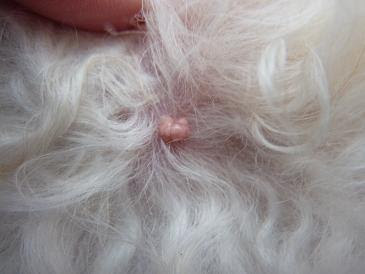The suffix is the bit that will tell you about what procedure, condition, disease or disorder you're dealing with.
-oma [oma] from Greek - swelling, mass, tumor
This is probably the most despised of all veterinary (and medical) suffixes, because it's associated with cancer. What the suffix itself really tells you, though, is that there is a lump or bump. Nothing more.
Not all medical terms that end with -oma mean a death sentence.
For example, a hematoma (hemo - blood) stands for a localized swelling caused by accumulation of blood due to damage of a blood vessel(s). An ear hematoma is really just a bruise gone wild. Seroma is similar, except it's a pocket of fluid/serum, rather than blood.
 |
| Aural hematoma. Image Pet Doctor Mom |
What about the masses and tumors?
What does the word tumor mean anyway? A tumor is an abnormal mass of tissue. That by itself doesn't tell you whether the tumor is benign (mostly harmless) or malignant (cancerous).
A good example of a mostly harmless tumor is a lipoma. Lipoma is a fatty growth which can generally cause problems only when it gets in a way or when it has something else hiding inside it.
Papilloma (papillomatosis) is a wart-like growth, typically caused by a virus.
 |
| Papilloma. Photo Organic Pet Digest |
For example, mammary gland tumors in dogs can be both either benign or malignant. Hair follicle tumors (trichoepitheliomas and pilomatricomas) are generally benign, but not always.
Melanomas (tumors of melanin/pigment producing cells) can be either benign or malignant.
Unfortunately, some tumors are always evil.
For example, a lymphoma (lymphosarcoma), a cancer of lymphocyte cells (type of white blood cells); Jasmine's best buddy died of that.
Osteosarcoma, a bone cancer, very evil, unfortunately the most common bone tumor in dogs.
Some -omas are evil, but not all. Before getting a heart attack at the sound of the suffix, find out what exactly you're dealing with.
Other suffixes:
Veterinary Suffixes (-itis)

Tidak ada komentar:
Posting Komentar